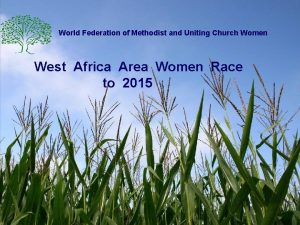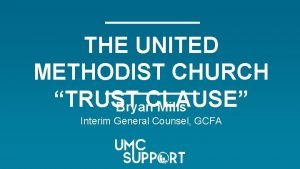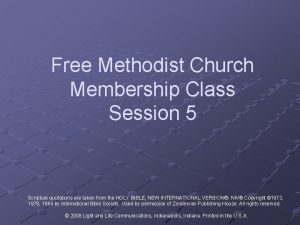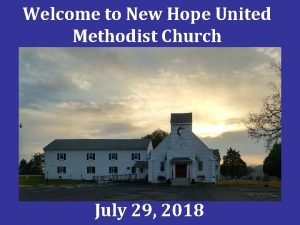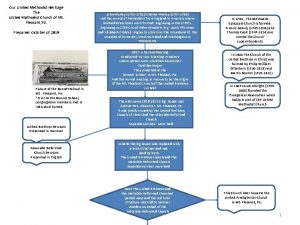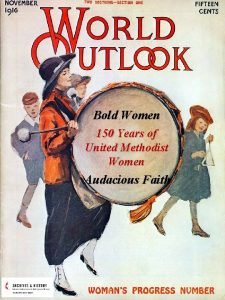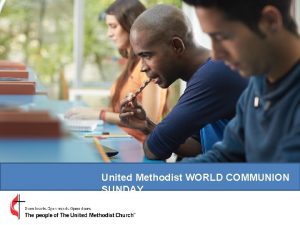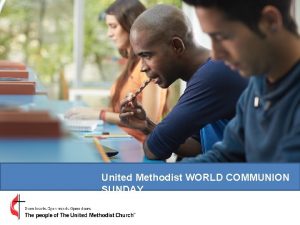Research Findings Women in the Methodist Church and












- Slides: 12

Research Findings: Women in the Methodist Church and Church of England Professor Anne-marie Greene Gender Diversity and Leadership Symposium 18 th -19 th June 2015 Roehampton University

Empirical Base • Interviews with 21 stipendiary clergy women in the Cof. E (2011 -12): with Mandy Robbins, Glyndwr University – Initial approach = union then snowballing/personal contacts – Sample: 13 with dependent children, 5 lone parents • Ongoing Interviews with stipendiary women presbyters in the Methodist Church (2013 -15): current number 17 – Random selection from list of all presbyters – Sample: 8 with dependent children, 5 lone parents • Uncover their stories within a framework of career, work, and employment – their calling; previous work experiences; selection and training experiences; reflections on work-life balance; job satisfaction; relationships with employment relations actors such as trade unions, and those acting in ‘management’ roles within the Church; and experiences of gender discrimination.

Gendered ministry? • Cof. E (2013 data) – 23% of stipendiary parish clergy – 11% of archdeacons, cathedral canons and clergy – Legacy of the ‘Theology of Two Integrities’ • Methodist Church (2015 data) – 40% presbyters are women – 25% superintendents, 30% district chairs – Gender Justice Committee monitoring report (2004): ‘the Methodist Church was ‘suffering from and perpetuating institutional sexism’. • Lack of application of the Equality Act 2010

‘Calling’ and the ‘sacrificial embrace’ • Peyton and Gatrell (2013) Managing Clergy Lives: Obedience, Sacrifice, Intimacy – ‘physical, intellectual and emotional selves are permanently claimed for the service of God’ (p 52) – ‘the embracing of personal sacrifice, and the governance of body and soul…underpinned by a theological and ministerial rationale, and ultimately an eternal dimension’ (p 86).

Experiences of direct and indirect sex discrimination • A key feature of their work – Selection and training experiences – Refusal to take communion /allow them to officiate at services – Collection of other examples • Clergy or congregation? • More examples in Cof. E than in Meth. ‘one of my colleagues patted me on the head in a meeting …for me it was more like right, this is telling me something about how you feel about me, which when it’s your team rector you kind of think I wonder if this is also informing some of the other things, not feeling… quite often I don’t feel heard. ’ (Rhiannon, Cof. E) I think there a number of men who are not good at dealing with women who seem to get drawn to the Church and don’t particularly know how to deal with women (Deidre, Meth) I still hear ‘we shan’t have another woman minister’. I don’t think anybody ever says ‘we shan’t have another man’ (Felicity, Meth)

Difficulty of being a woman in a man’s world • Stereotype of the male vicar, dominance of the male breadwinner model-Page (2008) • Family-life-work clashes, maternity and childcare issues • Lack of understanding of the demands of motherhood In the three years I’ve been in ministry the things that keep me awake at night have never been the funerals or the pastoral emergencies because they’re the job, it’s always the clash between job and home. . . I ended up having my daughter babysat by my training incumbent which. . . it’s really the personal and the professional colliding far too much. . . (Alice, Cof. E) We are managing…on my stipend at the moment. When D gets older and needs things like school uniform and school trips and things like that it’s going to be interesting. It’s, again it’s partly why I am exploring RAF chaplaincy because I would double my stipend overnight… (Rita, Meth)

Preferring not to take preferment • Methodist sample • Most would not consider superintendency – Admin and bureaucracy-away from the ‘frontline’ – Not my calling, not using my skills – Gendered notions of leadership, what the role is. …over my dead body would I be a superintendent…(Hilary, Meth) And from where I am at the moment I wouldn’t know as a chair of district could I, you know, if D goes to university in Oxford and I am chair of Cumbria district and he has a problem can I just drop everything and go or are there going to be things that I have to do that mean I can’t do that. (Rita, Meth) Women don’t want that responsibility… it requires a particular skill set…there’s a certain amount of moving furniture on the Titanic… I think the way the role is constructed is off putting to women… (Deidre, Meth)

Ability to challenge and resist discrimination • Strength of vocational commitment affects ability/willingness to resist/challenge ‘…this is not like many other sorts of employment. There is an element of sacrifice and giving to it’. (Amanda, Cof. E) • Over half felt isolated in their ministry • Lack of support : small minority would not know who to contact or could only utilise informal networks ‘. . . If it happens in a parish setting. . . there is no recourse. There’s nothing you can do about it, there is really nothing. ’ (Rachel, Cof. E) in my previous appointment I had a real serious problem with somebody which made me really ill but I didn’t do anything about it, I just laid low until I moved…it was a lay person you see. And what do you do about a lay person who’s giving you grief’. (Hazel, Meth)

Ability to challenge and resist discrimination ‘there needs to be some provision within the Church for those people who do not accept women priests. . . I don’t share their views but can respect that they hold them, and for the Church to just abandon them. . . is not being a loving sister or brother in Christ. ’ , (Veronica, Cof. E) There have been times…when I really wanted to walk away…yet because I’ve know it was a commission from God, I’ve not been able to do that (Amy, Meth) ‘…a lot of my work … is to kind of encourage reconciliation and the building of relationships and making allowances for people… my calling in a sense… I can make allowances… try to understand… we’re there to show an alternative way, that love does actually work’, (Kimberley, Meth)

Denominational differences • Are less overt examples of sex discrimination within the Methodist compared to Cof. E • But male dominated model of the minister is still very strong in both • Preferment pathways are different – Real resistance to taking on posts with more responsibility

What does this story tell us? • Illuminates the experiences of the unusual ‘work’ of this group of women • Overwhelming satisfaction with their ministry despite the stressors and the negative and discriminatory experiences ‘A bit of me that feels carried along on the wings of angels’ (Sheila, (Meth) ‘… you just have to keep stepping back and seeing the bigger picture and just seeing God and just being faithful to your calling… that’s the most amazing thing to be part of, that you can be part of changing the world and just being called. ’ (Edith, Cof. E) • God as ‘party’ to the work relationship: sacrificial embrace and its impact on willingness to accept

• References Bagilhole, B. (2003), ‘Not a glass ceiling more a lead roof: Experiences of pioneer women priests in the Church of England’, Equal Opportunities International, 25: 2, 109 -125 Bagilhole, B. (2006) ‘Prospects for Change? Structural, Cultural and Action Dimensions of the Careers of Pioneer Women Priests in the Church of England’, Gender Work and Organization, 10: 3, 361 -377. Page, SJ (2008) ‘The construction of masculinities and femininities in the Church of England: The case of the male clergy spouse’, Feminist Theology, 17: 1, 31 -42. Page, SJ (2011) ‘Negotiating sacred roles: a sociological exploration of priests who are mothers’, Feminist Review, 97, 92 -109. Page, S. J. (2012) ‘Femmes, méres at prêtres dans l’Église D’Angleterre: Quels sacerdoces’, Travail, Genre et Sociétés, Avril, 27: 55 -71. Page, S. J. (2014), The Scrutinized Priest: Women in the Church of England Negotiating Professional and Sacred Clothing Regimes. Gender, Work & Organization, 21: 295– 307. Peyton, N. and Gatrell, C. (2013) Managing Clergy Lives: Obedience, Sacrifice, Intimacy, Bloomsbury, London.
 World federation of methodist and uniting church
World federation of methodist and uniting church Arborlawn united methodist church
Arborlawn united methodist church Aldersgate united methodist church
Aldersgate united methodist church United methodist church trust clause
United methodist church trust clause New hope methodist church
New hope methodist church Warm beach free methodist church
Warm beach free methodist church New hope united methodist church
New hope united methodist church Howden methodist church
Howden methodist church Four oaks united methodist church
Four oaks united methodist church Findings of qualitative research
Findings of qualitative research Significant findings example
Significant findings example Communicating research findings in nursing
Communicating research findings in nursing Example of qualitative vs quantitative
Example of qualitative vs quantitative
